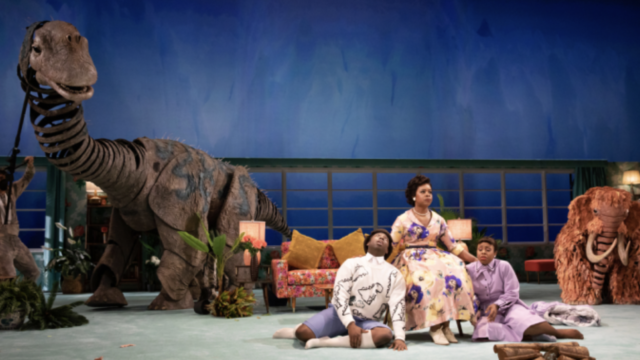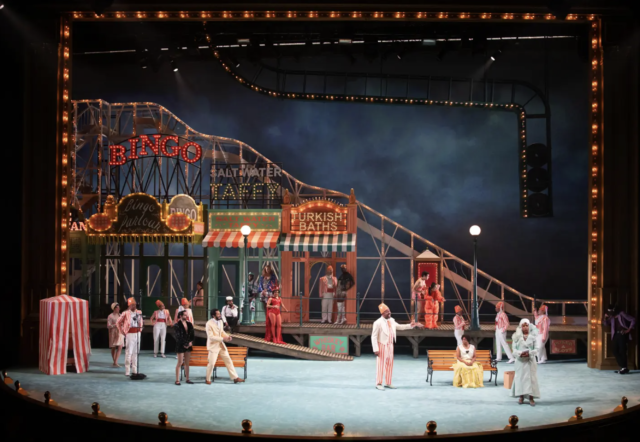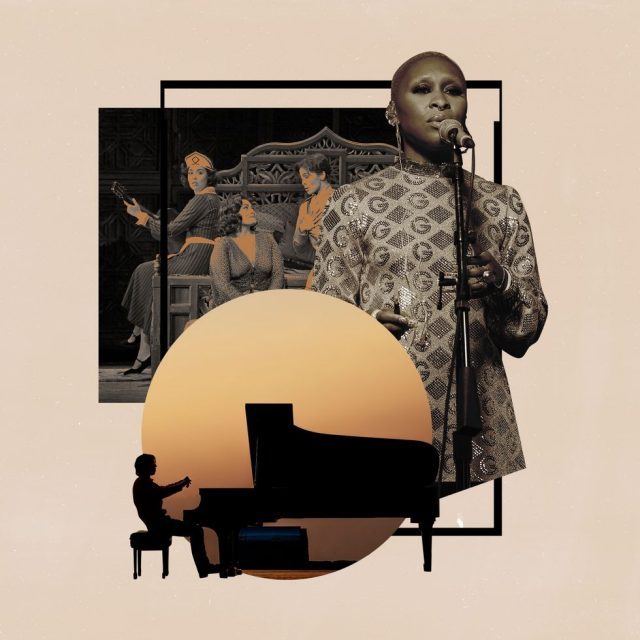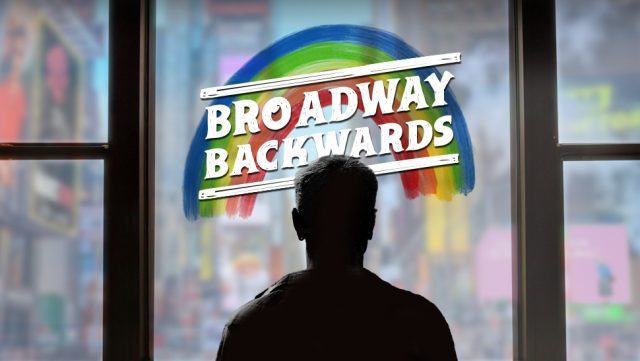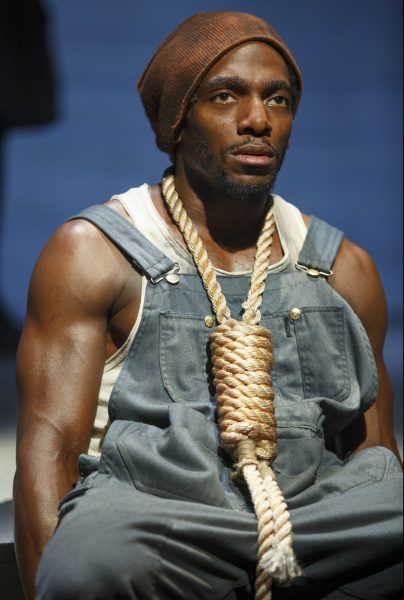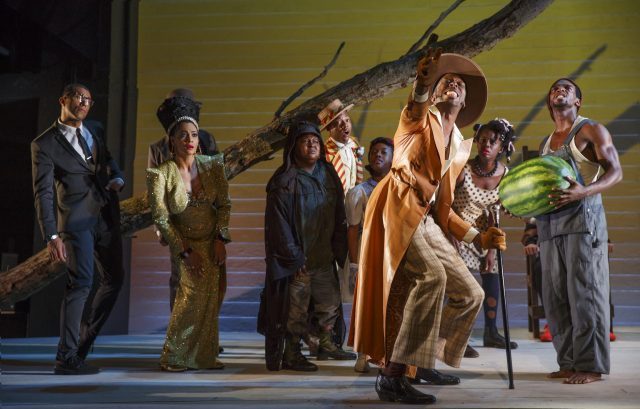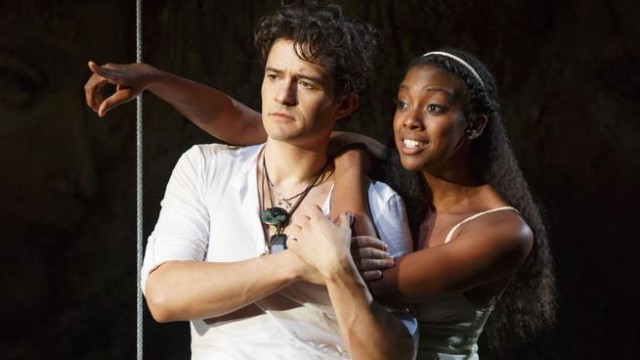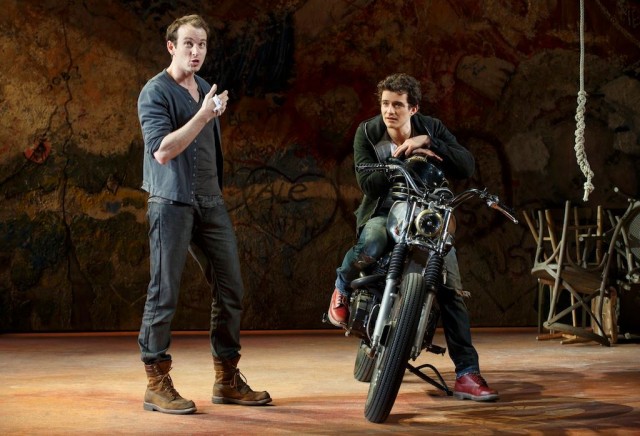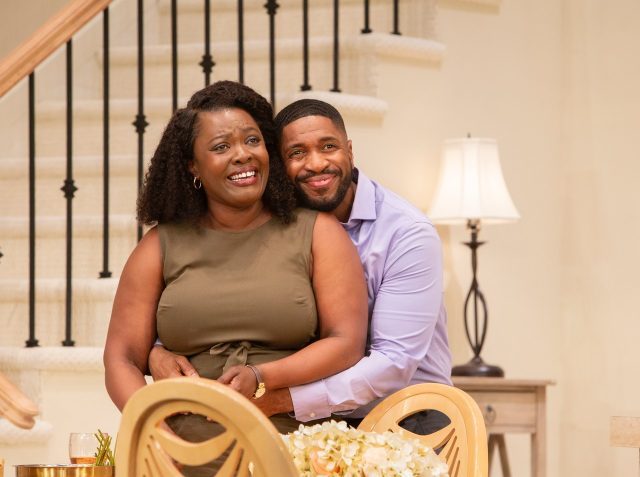
Beverly (Heather Alicia Simms) and Dayton (Charles Browning) get ready for a family affair in Jackie Sibblies Drury’s Fairview (photo by Henry Grossman)
Theatre for a New Audience, Polonsky Shakespeare Center
262 Ashland Pl. between Lafayette Ave. & Fulton St.
Tuesday – Sunday through August 11, $55-$115
866-811-4111
www.tfana.org
sohorep.org/fairview
At the beginning of Jackie Sibblies Drury’s Pulitzer Prize–winning Fairview, which has successfully transitioned from Soho Rep. to the much bigger Theatre for a New Audience, a black woman onstage approaches the fourth wall as if it were a mirror, checking her hair and applying lipstick, but she’s not seeing herself, of course; what she is looking at is a space filled primarily with white people who have paid good money to watch her and the other actors/characters in the dark. It’s an incendiary concept that gets more radical — and openly angry and confrontational — as the story makes its way through four ever-more-antagonistic acts, taking a recent theme to a whole new level of supreme discomfort.
There might be an explosion of high-quality plays on and off Broadway by black men and women about the black experience — think Suzan-Lori Parks, Branden Jacobs-Jenkins, Lynn Nottage, Tarell Alvin McRaney, Dominique Morisseau, Jocelyn Bioh, Jeremy O. Harris, Lydia R. Diamond, and Dael Orlandersmith, among others, as well as such directors of color as Kenny Leon, Liesl Tommy, Ruben Santiago-Hudson, Lileana Blain-Cruz, and Leah C. Gardiner — but the audience for these shows is still predominantly white, something that has not gone unnoticed by black artists. In the Flea’s 2015 interactive Take Care, written by the white Todd Shalom and the black Niegel Smith, who also directed, an audience member is given the job of pointing out all the black and brown people in the room and telling them to gather in a corner, as if being rounded up for nefarious purposes. (I had that responsibility when I attended.) In Jordan E. Cooper’s 2019 Ain’t No Mo’, in which all of the people of color in America are being sent back to Africa, a minister tries to get the mostly white audience to shout out the N-word, with no success save for one black woman the night I went.
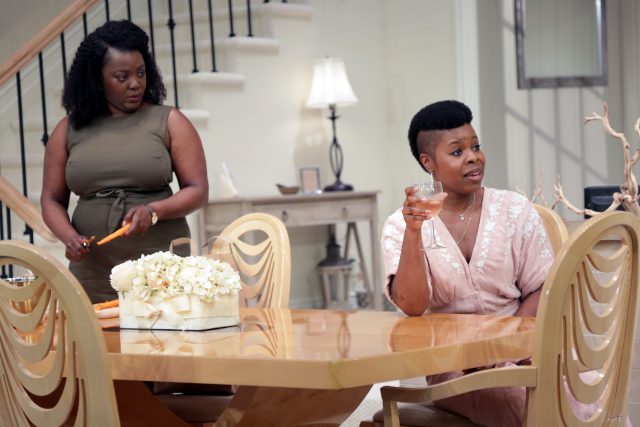
Sisters Beverly (Heather Alicia Simms) and Jasmine (Roslyn Ruff) do battle in Pulitzer Prize winner (photo by Gerry Goodstein)
In Thomas Bradshaw’s 2019 revival of Southern Promises at the Flea, also directed by Smith, a mini-Roots-like tale is performed by an all-person-of-color cast, playing slaves as well as slave owners and a white preacher; at the curtain call, much of the white audience stood and applauded, but a handful of blacks were silent, appearing distraught by what they had just witnessed. And in Triptych (Eyes of One on Another), a multimedia production about Robert Mapplethorpe’s photos of, among other subjects, black male bodies, with a score by the white Bryce Dessner and a libretto by the black Korde Arrington Tuttle, a black actor watches from the front of the stage, never speaking, until at one point he sits down in the primarily white audience and claps and cheers by himself, leaving the crowd to wonder if they just aren’t getting it. All of the above incidents are deeply uncomfortable moments involving race and, more specifically, the “segregation” that still exists in the theater.
“In America you are obsessed with race, and you never never never think about class,” a character says in Fairview. “The rich profit from the racism. The poor get nothing from it.” The play takes place on Mimi Lien’s almost blindingly white stage, a huge, fancy dining room / living room that feels like The Jeffersons meets The Cosby Show by way of Edward Albee and Noël Coward. At the front of the stage is a black border, a few feet high, that makes it look like the Frasier family (a nod to Kelsey Grammer’s popular Frasier sitcom?) is on a television screen while also serving as a small barrier keeping actors and audience separate. At the start, Beverly (Heather Alicia Simms) sings along with Sly & the Family Stone’s 1971 disco hit “Family Affair” on the radio, but the station changes a few times by itself, as if reminding the audience — and Beverly — that someone else is in charge.
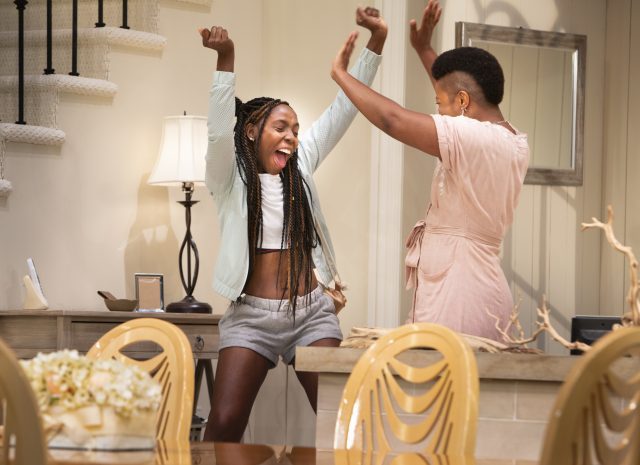
Keisha (MaYaa Boateng) and her aunt Jasmine (Roslyn Ruff) do some celebrating in Fairview (photo by Henry Grossman)
Beverly and Dayton (Charles Browning) are getting ready for a dinner celebrating her mother’s birthday; they are joined by their daughter, graduating high school senior Keisha (MaYaa Boateng), and Beverly’s gossipy sister, Jasmine (Roslyn Ruff). In the second act, the action is repeated, but silently, as four white people in voiceover (Hannah Cabell as Suze, Jed Resnick as Mack, Natalia Payne as Bets, and Luke Robertson as Jimbo) discuss the loaded question “If you could choose to be a different race, what race would you be?” It gets even whiter in the third act, when Beverly’s brother and his wife finally arrive and the matriarch comes downstairs, followed by a finale in which all hell breaks loose and theatrical conventions are turned inside out and upside down. What might be exhilarating at first quickly becomes something else as Drury (Marys Seacole,; We Are Proud to Present a Presentation About the Herero of Namibia, Formerly Known as South West Africa, from the German Südwestafrika, Between the Years 1884-1915), director Sarah Benson (In the Blood, An Octoroon), and Boateng/Keisha go where no play has gone before, particularly involving gender, class, and stereotyping in addition to race.
The stellar production, which has been extended at the Polonsky Shakespeare Center in Brooklyn through August 11, is ingeniously directed by Benson, who navigates the changing emotional temperatures of the four distinct acts, with terrific lighting by Amith Chandrashaker, sound by Mikaal Sulaiman, and costumes by Montana Levi Blanco, fully immersing everyone in the ever-darker proceedings. Fairview — the name itself can be broken into two words, explaining part of Drury’s mission — offers a very different experience to white audiences as compared to black and brown theatergoers. Regardless of your color, however, there’s nothing you can do to prepare yourself for what happens, or for your ultimate reaction, as white privilege and white guilt take center stage without apology.
